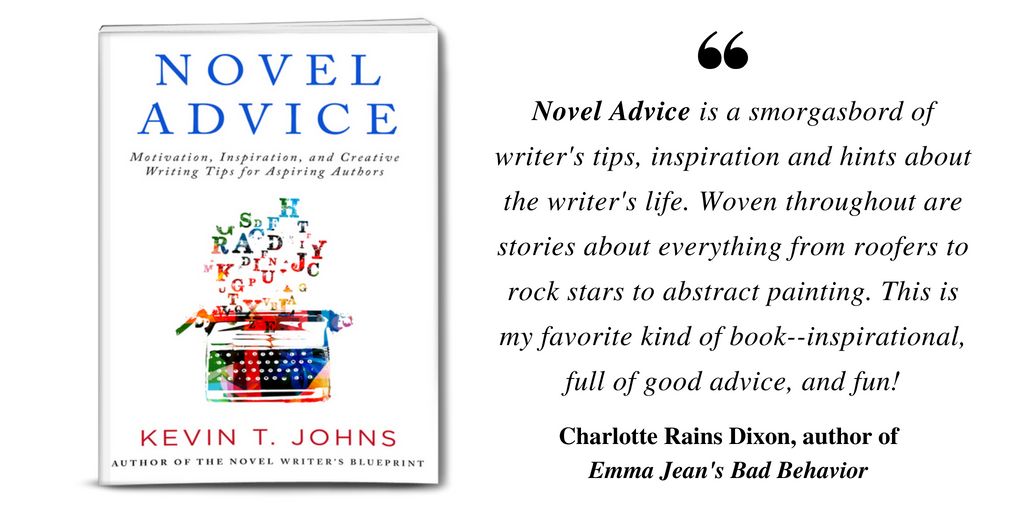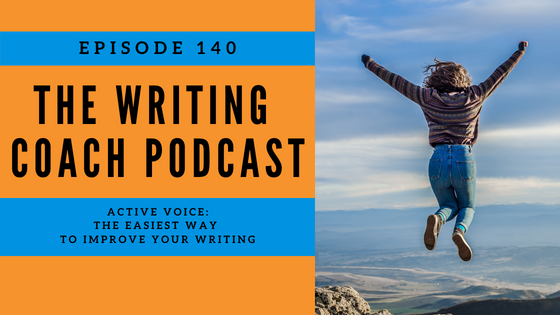As a writing coach, everyday writers come to me asking how they can improve their writing.
Using “Active Voice” is one of the easiest ways to improve the quality of any piece of writing.
Sentences written in Active Voice organize words so that the subject of the sentence is doing the action, not the object.
Confused? Don’t worry, I break it down for you in this episode of The Writing Coach podcast.
Listen to the episode or read the transcript below:
Join the Fall 2022 edition of STORY PLAN INTENSIVE: sign-up now. The program kicks-off on October 3, 2022.
The Writing Coach Episode #140 Show Notes
Get Kevin’s FREE book: NOVEL ADVICE: MOTIVATION, INSPIRATION, AND CREATIVE WRITING TIPS FOR ASPIRING AUTHORS.

The Writing Coach Episode #140 Transcript
Hello, beloved listeners and welcome back to The Writing Coach podcast. It is your host as always writing coach Kevin T Johns here.
If you listened to last episode and you found the audio a little odd, I apologize. In the editing and prepping of the episode for you, I went a little heavy-handed on the compression <laugh> resulting in a rather strange-sounding episode. I’m going to do my absolute best to make sure that today’s audio is not quite so compressed.
All right, we are like days away from launching STORY PLAN INTENSIVE. That is my free program, Four weeks of free training and homework to help you plan a rock solid outline for your book in 30 days or less. We’ve got over a hundred people signed up already, but I know, I know from the numbers I, I can see you folks listening to this podcast, so I know there’s a lot of people out there listening to this who haven’t signed up for it yet. So head on over to www.kevintjohnso.com, go to the show notes for this episode, this episode 140 of the Writing Coach Pod and get signed up for STORY PLAN INTENSIVE. You’re not going to believe how powerful a program it is.
Now, today I want to talk to you, dear listener, about nitty gritty stuff. Today I want to talk about active voice in your writing. Yeah, sometimes we’re talking mindset and big picture, but today we’re going down into the mechanics. I hope you’re excited as I am about talking active voice, and I really am excited because I think it’s one of the easiest ways to improve the quality of someone’s writing and included yours in mine.
Using “active voice” is one of the easiest ways to improve the quality of your writing.
Sentences written in active voice organize words so that the subject of the sentence is doing the action, not the object. For example, here’s a sentence written in active voice:
Kevin ate the bananas.
In this example, our protagonist Kevin (the sentence’s subject) is doing the action of eating (verb) some bananas (object).
While this approach to sentence construction appears simple and obvious, aspiring authors have a tendency to fall into the habit of using passive voice in their fiction writing.
Here is the same sentence as it would appear in many a manuscript:
The bananas (object) were eaten (verb) by Kevin (subject).
Note how switching the order of the subject and object weakens the sentence’s impact. Written in the passive voice, the sentence becomes about the bananas as opposed to being about our character, Kevin.
In this article on passive vs. active voice, English grammar expert Mignon Fogarty uses the excellent example of Marvin Gay song, “I heard it through the grapevine.”
Re-writing the song title into the passive voice, Fogarty transforms it into the inelegant and confusing, “It was heard by me through the grapevine,” deftly clarifying the problem with passive voice.
The passive version is unnecessarily complex, adds unnecessary words, and reduces comprehension and clarity.
The active version of a sentence almost always does a better job of quickly creating a visual image in the mind of the reader.
Strunk and White warn against the use of passive voice in their seminal style guide, The Elements of Style.
Likewise, George Orwell, in his essay, Politics and the English Language, proposes the rule: “Never use the passive where you can use the active.”
That said, using passive voice isn’t always a mistake. There are situations where an author may consciously choose to write in passive voice.
You may want to use passive voice when the object of the sentence is more important than the subject:
James Bond (object) was shot (verb) by a random henchman (subject).
In this sentence, the object, Mr. Bond, is who the readers care about, not the random henchman, and the sentence is structured accordingly.
Passive voice is also helpful when you want to leave the subject of the sentence intentionally vague or unknown:
The innocent girl was murdered.
In this example, the sentence’s missing subject produces an intentional air of mystery.
Now here’s where things can get a little controversial …
Some people mistakenly suggest all sentences using versions of the verb “to be” – including the past tense versions “I was” (singular) and “we were” (plural) – are in passive voice.
While this is not technically the case, I understand the confusion.
In fact, in my mind, I often drop the use of “was” sentences into the same mental bucket as other passive voice sentences.
I do so largely because these “was” sentences produce similar negative effects as their passive voice counterparts.
For example, the sentence, “Kevin was eating the bananas,” is already in the active voice. All the same, I recommend revising the sentence to read, “Kevin ate the bananas.”
Removing “was” and transforming the verb “eating” into “ate” strengthens the sentence, clarifies the meaning, and supports comprehension in the same way as transforming a sentence from passive to active voice.
When it comes to the use of active and passive voice there is, as usual, some flexibility regarding the rules.
With that in mind, I encourage you to hunt down the unintentional use of passive voice in your writing.
Redrafting those sentences into their active counterparts will almost certainly be one of the swiftest paths to improving the quality of your writing.
People come to writing coaches like me, always looking to improve their writing. “How can I make this better?” And sometimes it’s as simple as switching your sentence into an active voice.
All right, as we said off the top, STORY PLAN INTENSIVE kicks off on Monday. This will be four weeks of training and support and homework. The entire focus of it is to get your mind wrapped around a story plan for your book in four weeks or less. You are going to finish the month with an incredible rock solid outline that not only identifies the structure of the book, but also ensures that the fundamentals of good story craft of good storytelling have been executed on this framework, on this blueprint that you’re going to build your narrative upon.
Especially if you are participating in National Novel Writing Month this year, if you plan to sit down in November and get a ton of material written, I really, really encourage you to sign up for STORY PLAN INTENSIVE. It’s the exact kind of concentrated focused, hard planning work that you want to put in in order to set yourself up for success in something like NaNoWriMo.
To get signed up for STORY PLAN INTENSIVE, head on over to www.kevintjohns.com. This is episode 140 of The Writing Coach podcast. Head on in there and go to the show notes for this episode. I’ll link to that great Orson Wells essay, Politics and the English Language. I’ll link to where you can buy a copy of The Elements of Style, if you don’t have the elements of style yet. And of course, I’ll have a link to where you can get signed up for a STORY PLAN INTENSIVE.
Did I mention that it’s free? Did I tell you it’s free? It’s a free program and I would love to see you benefit from it. So get signed up.
I’m just jazzed. I’m excited. This is the third time I’ve run STORY PLAN INTENSIVE now and you know, having done it twice, I am so confident in how it works and how much fun it is. And every time I do it, I meet new writers who I end up working with and coaching and develop new friendships, new relationships, and, and just seeing someone come in a little vague, a little confused or perhaps with no idea at all about what they want to write about and finish the month totally solid and confident and part of a community it, it’s an amazing thing. I’m so looking forward to it.
That is it for this episode. Remember to hit subscribe so that I can see you on the next episode of The Writing Coach.
Podcast: Play in new window | Download
Subscribe: Apple Podcasts | RSS






